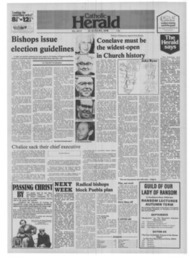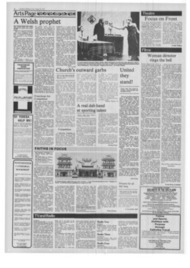Page 8, 25th August 1978
Page 8

Report an error
Noticed an error on this page?If you've noticed an error in this article please click here to report it.
Tags
Share
Related articles
Films
Gang Of Art Crooks Intent On Murder
Humane Humour In Story Of Jewish Immigrants
King Vidor Steps Silently From The Crowd
Mission Experts Plan Modern Approach
Woman director rings the bell
Women directors are about as rare in the film studios as women conductors in the concert hall. Any who promise as well as Joan Micklin Silver continues to do with Between the Lines ("AA", Screen on the Hill) can bring enrichment and freshness to the dry, male chauvinist world the cinema has latterly become.
Mrs Silver began her film work in the script department -a good place to begin. But when her own story "Limbo" was mangled in the making she realised that if she had anything to say in the cinema she must make the films herself.
"Hester Street", about early Jewish immigrants to Brooklyn, made a great impression. "Between the Lines", written by Fred Barron, is about the running of a small Boston magazine by its very young staff of enthusiasts. The threatened takeover by a big commercial concern is not made quite the cliche it sounds.
Mrs Silver's gift is to make her movies come alive and to present her people as human. I didn't like the whole of "Between the Lines" as much as I liked parts of it. But these ambitious youngsters are certainly enthusiastic, fairly balanced, and Mrs Silver knows how to make them credible and consistently watchable.
Story of an Unmarried Woman ("X", Warner), seen in Cork, is written and directed by Paul Mazursky. While it is of course highly competent, it is a much more contrived venture into contemporary feminism.
For "unmarried" read "divorced" — through no fault of the heroine whose husband, after 17 years of happy marriage, falls for a passing girl and "wants out". After a brief essay at love in the art-world with a painter, Saul (Alan Bates), she settles for the status legally called "feme sole".
The difficulty may be to convince women in the audience that this faute de mieux independence with a fast-growing daughter is a happy ending. The movie's assets are Jill Clayburgh, herself a real and rare up-dating of old-fashioned glamour, and Mazursky's expert New York backgrounds.
Midnight Express ("x", Odeon, Haymarket). 1 also saw in Cork and Initial it as odious as its portrayal of Turkish jails is no doubt intended to be. Charged with whitewashing the crime to blacken the punishment, the director Alan Parker insists that the movie does not commit itself either way.
But by not condemning Billy Hayes (Brad Davis is good) for try ing to smuggle two kilos of hashish into Turkey, the movie must be suspect or condoning him — or at least of belittling his crime to blacken his brutal punishment.
Australia's impressive contribution to this year's Cork Festival did not include the double bill now at the Scala, Tottenham Street. But Phil Noyce, director of the brilliant documentary, "Newsfront", which was shown at Cork and will open this year's London Film Festival, is also producer-director of Backroads (Scala).
I vastly preferred the supposed second feature, The Love Letters from Teralba Road (Scala) written and directed by Richard Wallace. The love-letters, said to have been discovered by accident, are from an uneducated storekeeper (Bryan Brown) whose violence has driven his wife (Kris McQuade) home to her family. Extracts from the letters are read in the technique known as "voice over" while we watch the couple's inarticulate efforts to find a way back together. This is a film of true feeling. With no surface attractions, Wallace and his two principals compel our profound involvement.
"Backroads", on the other hand, is a pretty horrid trip by stolen car through desert country with a foulmouthed white man (Bill Hunter, another prominent Australian figure at Cork) and an Aboriginal (Gary Foley). plus a couple of stray passengers. The characters backgrounds are skilfully conveyed through car conversations behind which is an important statement about white-black relations in Australia.
But the appalling monotony of the monosyllabic obscenity in which the conversations are conducted makes for intolerable entertainment. One asset of this double bill is the supposedly uncommercial length of both features: respectively 60 and 50 minutes.
Since I first saw "Sarajevo", in 1947, Max Ophuls was one of my favourite film directors. Today he is posthumously a world-wide favourite, and the British public this summer has a double opportunity to catch up on his work.
Two retrospective seasons of all Ophuls's available films are being held, one now on at the Edinburgh Film Festival, the other at the National Film Theatre from September 2 to 21.
Anybody who cares for style and taste in cinema is urged to get a programme from the National Film Theatre, South Bank, and pick what he cart of such civilised romantic films as "Sarajevo" or Letter from an Unknown Woman".
Meanwhile here is Lola Monte ("A", Camden Plaza), Ophuls's last film, and many think his greatest. It is certainly a splendiferous and dazzling spectacle, this flashback fantasia of the life of the notorious dancer or femme fatale whose admirers ranged from Franz Liszt to King Ludwig 11 of Bavaria.
The point of departure for Ophuls's whirling flashbacks is the circus, where Peter Ustinov's superb Ringmaster persuades the ageing Lola (Mat-tine Carol) to sell kisses for a dollar a time. Here is the quintessence of "showbiz" beyond De Mille's wildest dreams. Great stylist that Ophuls was, however, his films are never purely spectacular, never all eye or ear; they are all heart too. Outside the ring Lola's coach carries her from memory to memory.
The scenes with Anton Walbrook as the eccentric King Ludwig are infinitely tender, the final tragic irony eloquent in comment on the interplay of life and art. This film has had a chequered career of being mutilated and salvaged. The present is as nearly complete a version as we are likely to see.
Pick of the week's films on television
MONDAY A Song is Born (1949) and Knack on Wood (1954). Of this Danny Kaye double, don't miss the lunch-time (1 pm) feature in which Danny and a team of top jazz musicians, including Benny Goodman and Tommy Dorsey, expound and execute jive besides getting mixed up with crooks. Then at 2.50 pm, he appears as a Swiss ventriloquist with Mai Zetterling and again international crooks. BBC-1.
Freda Bruce Lockhart
blog comments powered by Disqus











